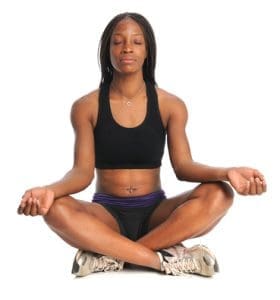You stored telling your self to interact in stress-free actions, so that you gave meditation, yoga, and mindfulness workouts a go. Not solely did they not work, they made your nervousness worse. “Are you kidding me?”
Since many of the issues we fear about don’t occur, bolstered within the mind is, ‘See, I anxious and nothing dangerous occurred, so it is sensible that I ought to proceed worrying.’
Why does residing with an emotional or psychological sickness must be so onerous? Proper?
I imply, it makes excellent sense that partaking in confirmed stress-free actions would soothe the anxious beast. However no, it doesn’t go that means for many people. Heck, it’s like a med that works effectively for others, however doesn’t do squat for us.
Nuts!
Properly, it’s occasions like these that we have to study all we will about our “eccentricities,” perceive it isn’t simply us, make the indicated changes, and maintain transferring ahead.
Talking of which…
“Individuals with nervousness might strategically select worrying over stress-free”
Ran into some analysis from Penn State College I imagine you’ll discover attention-grabbing and useful. I did.
“Individuals with nervousness might strategically select worrying over stress-free” was written by Katie Bohn for Penn State Information. The examine she detailed was printed within the Journal of Affective Issues.
Why would we try this?
Okay, the examine reveals that these of us who wrestle with nervousness might actively resist rest in an effort to proceed worrying. Why would we try this? In accordance with psychology professor Dr. Michelle Newman and staff, it’s to keep away from a big leap in nervousness ought to one thing dangerous occur.
That matches my expertise with relaxation-induced nervousness (RIA) like a glove.
The staff discovered that individuals who had been extra delicate to shifts in unfavorable emotion – as an example, shortly transferring from a relaxed state to certainly one of worry – had been extra more likely to really feel anxious whereas being led by means of rest workouts.
From Dr. Newman…
Individuals could also be staying anxious to forestall a big shift in nervousness, nevertheless it’s really more healthy to let your self expertise these shifts. The extra you do it, the extra you notice you are able to do it and it’s higher to permit your self to be relaxed at occasions. Mindfulness coaching and different interventions can assist folks let go and dwell within the second.
By the best way, are you able to relate to being delicate to shifts in unfavorable emotion? So long as we’re doing questions, are you coping with RIA?
Why do rest strategies improve nervousness?

“The extra you do it, the extra you notice you are able to do it. Hold saying it.”
Dr. Newman says researchers have recognized about RIA because the Nineteen Eighties, however the particular trigger stays within the shadows. Really, Newman believes she started shining some gentle on the matter when she developed the distinction avoidance concept in 2011.
What’s that?
The distinction avoidance concept
The distinction avoidance concept revolves across the notion that we might deliberately (maybe with out understanding it) make ourselves anxious as a option to keep away from the letdown we’d really feel if one thing – something – dangerous occurred.
In fact, such pondering does us completely no good and solely makes us extra depressing. However right here’s the biggie. Since many of the issues we fear about don’t occur, bolstered within the mind is, “See, I anxious and nothing dangerous occurred, so it is sensible that I ought to proceed worrying.”
As misguided as it’s, it is sensible.
The heart of the examine
The analysis staff recruited some 100 individuals, evenly break up between generalized nervousness dysfunction (GAD) sufferers, main depressive dysfunction (MDD) sufferers, and a management group with neither.
The individuals had been led by means of rest workouts earlier than watching movies that held the potential to generate worry or disappointment. Then it was on to answering questions designed to measure sensitivity to modifications in emotional state.
Factor is, some might have discovered the unfavorable feelings incited by the movies uncomfortable proper after rest workouts. However others might have felt the workouts helped them cope with their unfavorable feelings.
Properly, the staff led the individuals by means of one other rest train session earlier than asking for the completion of a second survey.
The underside-line
Right here’s the bottom-line: The GAD sufferers had been extra more likely to be delicate to sharp spikes in emotion – like going from feeling relaxed to being frightened or pressured. And the staff linked the sensitivity to feeling anxious throughout classes supposed to induce rest.
Although not as robust, the identical outcomes had been famous for the MDD sufferers.
In accordance with graduate pupil Hanjoo Kim…
Measuring relaxation-induced nervousness and implementing publicity strategies concentrating on the desensitization of unfavorable distinction sensitivity might assist sufferers scale back this nervousness. Additionally, it could be vital to look at relaxation-induced nervousness in different issues, equivalent to panic dysfunction and protracted gentle despair.
And there you may have it.
You’re not alone
I’ve been on a mission for many years to negate the freak-factor concerned with residing with an emotional or psychological sickness. I’ve stated it again and again: understanding others had been in the identical boat offered lots of consolation within the early years of my sickness.
Does your nervousness spike while you try and do one thing stress-free? Properly, you aren’t alone, and now you may have some perception into why it occurs and what to do about it.
Verify-out the complete article on Penn State Information: “Individuals with nervousness might strategically select worrying over stress-free”
And people Chipur data and inspiration articles: assessment the entire titles or by class beneath.


After a decades-long battle with panic, generalized nervousness, fluctuating moods, and alcohol dependence; Invoice lastly discovered his life’s ardour and work – lending a hand to these in the identical boat. At age 49 he hit grad faculty and earned his counseling credentials. And he continues his service by means of Chipur and different initiatives.


